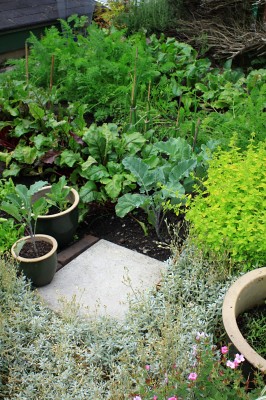by Ilaria Lonigro
 |
| Photo by Simon Howden, FreeDigitalPhotos.net |
A green revolution is spreading throughout the suburbs of European countries. And its 'weapons' are... tomatoes and courgettes. It's called rooftop-farming and it's the eco-friendly descendant of the urban agriculture movement which spread through big European cities during the second world war.
Do you remember the “Dig for Victory” initiative in the UK? Or the war gardens in Italy? During the last world conflict more than 1.4 million allotments were cultivated by English people. It was a smart (and desperate) way to feed the cities during that very sad time of our history.
Urban gardens recently came back as very important food providers during the Egyptian Revolution. It seems that among the “fruits” of the protests of Tahrir Square there were green rooftops. Greening up rooftops and terraces isn't just something connected to conflicts, but to health and environment. They're growing from France to Turkey, from Germany to Italy, covered by photovoltaic greenhouses and they provide people with sustainable farm-to-fork vegetables, which is the latest healthy trend also promoted overseas by the United States first lady Michelle Obama, who first cultivated a portion of the White House garden.
Behind the rooftop gardens there's also an important claim to the right to have healthy, organic and fresh food at a low price. And the right not to depend on the decisions of 10 big food industries which control more than 67% of seeds licenses. According to FAO, one metre squared of land produces 30 kilos of tomatoes per year, 36 lettuce tufts every two months and a hundred onions every four. Additionally, rooftop gardens absorb the effects of traffic.
 |
| Photo by Simon Howden, FreeDigitalPhotos.net |
Besides all this, rooftop gardens fight poverty as well and, as a side effect, they also produce friendship and cooperation among the inhabitants of different buildings. Food security, community cohesiveness, improvement of air quality are just a few of the good effects that such a plan might have on cities and their inhabitants.
The “rooftop gardening virus” has hit Italy too. Gianpiero Bocci (Pd party), a member of the Parliament, proposed to give financial incentives (up to 10 000 euro) to those who cultivate their urban rooftop. While in Berlin lettuce and tomatoes grow on the rooftop of the cultural centre Malzfabrik, a former malt factory. The project has been running since June 2011 and it's very innovative, since it involves also fish, particularly carps, that, kept in a large basin, help the vegetables growing. It's called Acquaponic and it's a technology which combines vegetables farming and fish in a closed-off circuit. Nicolas Leschke, 33, Director of Malzfabrik, says that anyone can do it at a very little expense and that one container can feed a three-person family for 2/3 of its needs.
Rooftop gardening is spreading all over the Mediterranean area as well, as documented by the Italian expedition Mediterraid in 2011. Someone calls it “urban agricivism”, some others “green revolution”. No matter the way you call it: start digging!

No comments:
Post a Comment